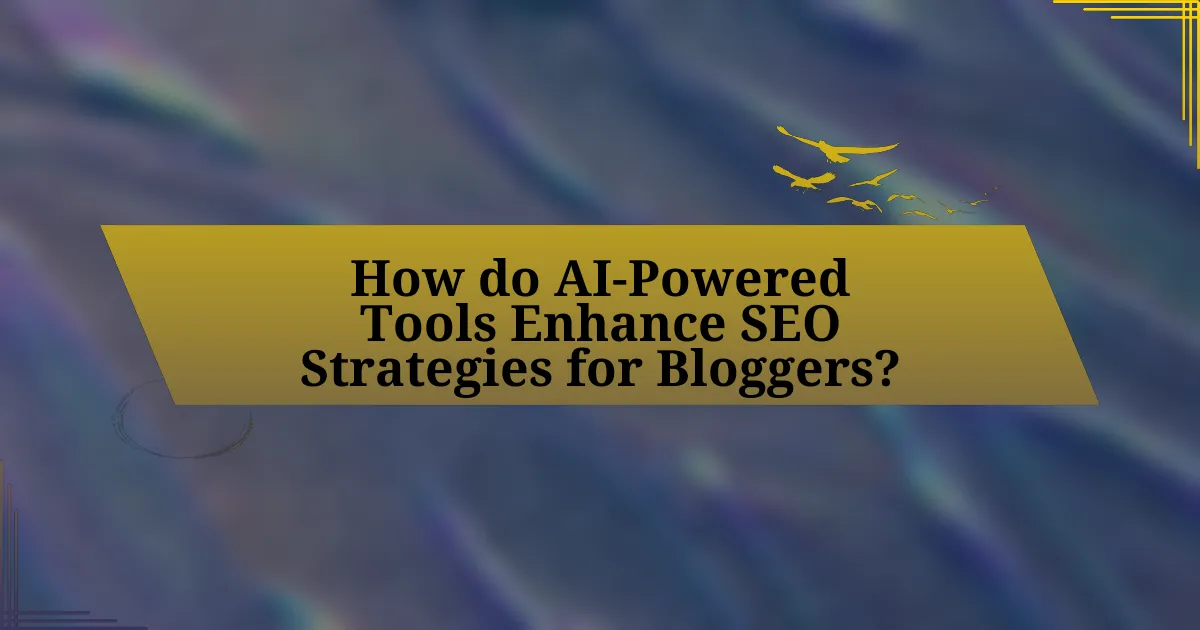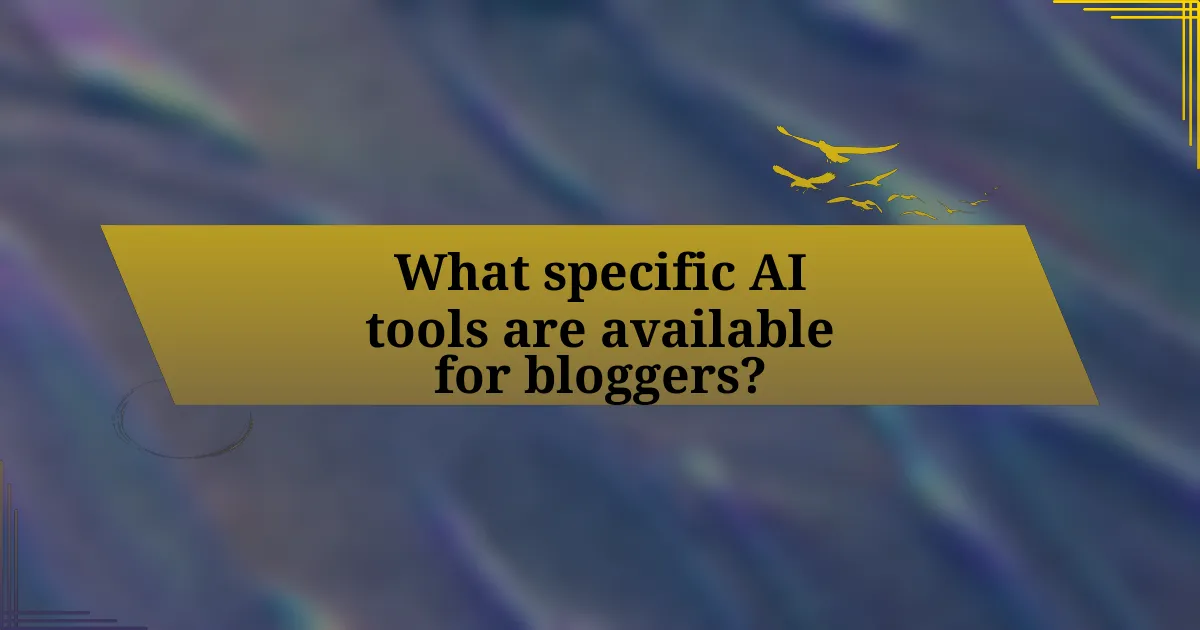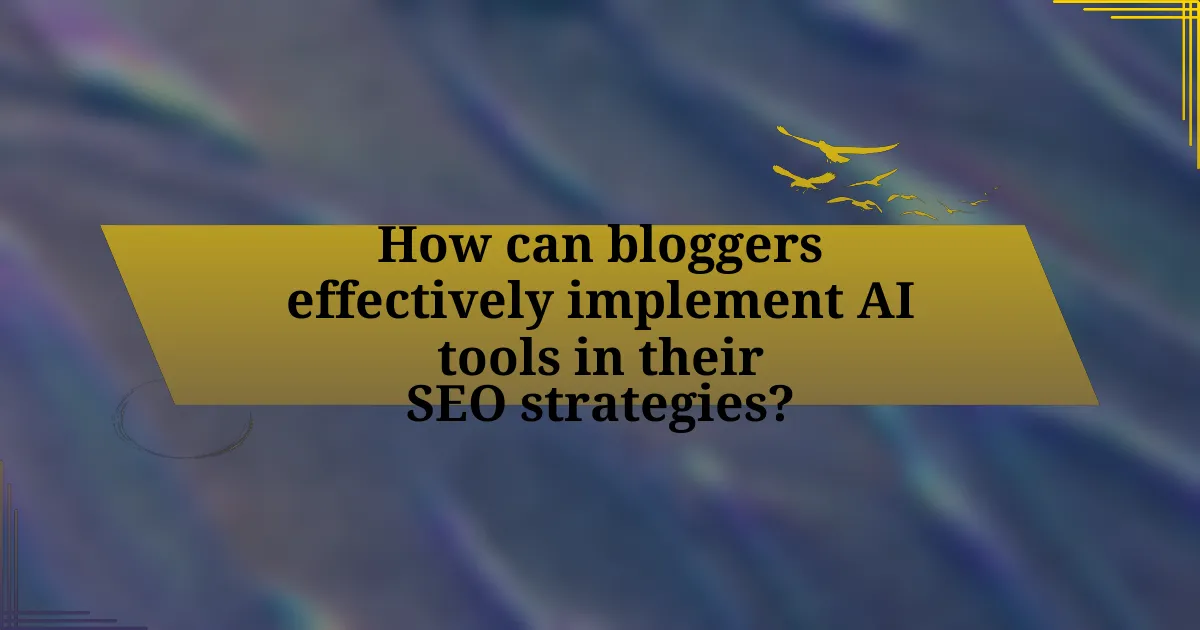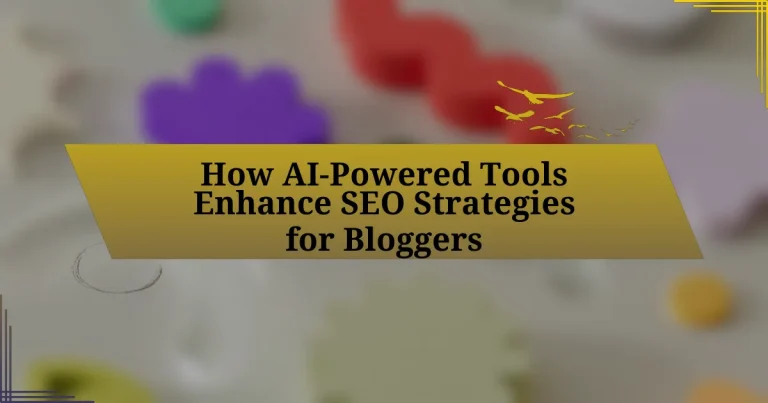AI-powered tools significantly enhance SEO strategies for bloggers by automating processes such as keyword research, content optimization, and performance analysis. These tools utilize machine learning algorithms to identify trending keywords, optimize content for search engines, and provide data-driven insights that improve visibility and engagement. Key features include advanced keyword analysis, predictive analytics, and automated reporting, which collectively streamline the SEO process and save time. The article also explores specific AI tools available for bloggers, their unique functionalities, and best practices for ethical and effective implementation in SEO strategies. Additionally, it addresses common challenges and future trends in AI’s role within the SEO landscape.

How do AI-Powered Tools Enhance SEO Strategies for Bloggers?
AI-powered tools enhance SEO strategies for bloggers by automating keyword research, optimizing content, and analyzing performance metrics. These tools utilize machine learning algorithms to identify trending keywords and phrases, allowing bloggers to create content that aligns with search intent. For instance, tools like SEMrush and Ahrefs provide insights into keyword difficulty and search volume, enabling bloggers to target effective keywords. Additionally, AI tools can analyze existing content for SEO best practices, suggesting improvements such as keyword placement and readability enhancements. According to a study by HubSpot, 61% of marketers say improving SEO and growing their organic presence is their top inbound marketing priority, highlighting the importance of these tools in achieving SEO success.
What are the key features of AI-powered SEO tools?
AI-powered SEO tools offer several key features that enhance search engine optimization strategies. These features include advanced keyword analysis, which utilizes machine learning algorithms to identify high-performing keywords and phrases relevant to a specific niche. Additionally, AI tools provide content optimization suggestions by analyzing existing content and recommending improvements based on SEO best practices.
Another significant feature is predictive analytics, which forecasts trends and user behavior, allowing bloggers to tailor their content strategies accordingly. Furthermore, AI-powered tools often include automated reporting, enabling users to track performance metrics efficiently and make data-driven decisions. These features collectively empower bloggers to optimize their content effectively and improve their search engine rankings.
How do these features improve keyword research?
AI-powered tools enhance keyword research by providing data-driven insights that identify high-potential keywords. These tools analyze search volume, competition, and trends, allowing bloggers to target keywords that are more likely to drive traffic. For instance, tools like SEMrush and Ahrefs utilize algorithms to evaluate keyword difficulty and suggest related terms, which helps in discovering niche opportunities. This data-centric approach increases the efficiency of keyword selection, ultimately improving the effectiveness of SEO strategies.
What role does content optimization play in AI tools?
Content optimization is crucial in AI tools as it enhances the relevance and quality of digital content, improving search engine rankings and user engagement. AI tools analyze vast amounts of data to identify keywords, trends, and user intent, allowing for tailored content that meets audience needs. For instance, tools like Clearscope and Surfer SEO utilize algorithms to suggest optimal keyword usage and content structure, which can lead to higher visibility in search results. This data-driven approach not only boosts SEO performance but also aligns content with user expectations, ultimately driving traffic and conversions.
Why should bloggers consider using AI for SEO?
Bloggers should consider using AI for SEO because it significantly enhances content optimization and keyword analysis. AI tools can analyze vast amounts of data quickly, identifying trending keywords and topics that resonate with target audiences. For instance, a study by HubSpot found that companies using AI-driven SEO strategies saw a 50% increase in organic traffic. This demonstrates that leveraging AI not only streamlines the SEO process but also leads to measurable improvements in visibility and engagement.
What advantages do AI tools offer over traditional SEO methods?
AI tools offer significant advantages over traditional SEO methods by automating data analysis and optimizing content strategies more efficiently. These tools utilize machine learning algorithms to analyze vast amounts of data, identifying patterns and trends that human analysts may overlook. For instance, AI can predict keyword performance based on historical data, enabling bloggers to target high-traffic keywords more effectively. Additionally, AI tools can generate content suggestions and optimize on-page elements in real-time, enhancing user experience and engagement. This level of automation and precision leads to improved search rankings and increased organic traffic, as evidenced by studies showing that websites using AI-driven SEO strategies experience up to 30% higher traffic compared to those relying solely on traditional methods.
How can AI tools save time and resources for bloggers?
AI tools can save time and resources for bloggers by automating content creation, optimizing SEO, and analyzing audience engagement. Automation allows bloggers to generate high-quality articles quickly, reducing the time spent on writing and editing. For instance, tools like Jasper and Copy.ai can produce drafts in minutes, enabling bloggers to focus on strategy rather than content generation.
Additionally, AI-powered SEO tools, such as SEMrush and Ahrefs, streamline keyword research and provide insights on optimizing content for search engines, which traditionally requires extensive manual effort. These tools can analyze competitors and suggest improvements, saving hours of research time.
Furthermore, AI analytics tools, like Google Analytics and HubSpot, help bloggers track audience behavior and engagement metrics efficiently, allowing for data-driven decisions without the need for complex manual analysis. This combination of automation and analytics significantly enhances productivity and resource management for bloggers.

What specific AI tools are available for bloggers?
Specific AI tools available for bloggers include Grammarly, which enhances writing quality through grammar and style suggestions; Yoast SEO, which optimizes content for search engines; and Jasper, an AI writing assistant that generates content ideas and drafts. These tools improve the blogging process by ensuring high-quality writing, optimizing for SEO, and streamlining content creation. For instance, Grammarly’s advanced algorithms analyze text for clarity and engagement, while Yoast SEO provides real-time feedback on keyword usage and readability, making them essential for effective blogging.
How do popular AI tools compare in terms of functionality?
Popular AI tools vary significantly in functionality, with each offering unique features tailored to different aspects of SEO. For instance, tools like SEMrush and Ahrefs excel in keyword research and backlink analysis, providing comprehensive data on search engine rankings and competitor strategies. In contrast, tools such as Surfer SEO and Clearscope focus on content optimization, using natural language processing to suggest improvements based on top-ranking pages. Additionally, platforms like Moz provide a suite of SEO tools that include site audits and rank tracking, while tools like ChatGPT and Jasper specialize in content generation, enabling users to create SEO-friendly articles efficiently. This diversity in functionality allows bloggers to choose tools that best fit their specific SEO needs, enhancing their overall strategy.
What unique features does each tool provide?
AI-powered tools for SEO provide unique features that enhance blogging strategies. For instance, tools like SEMrush offer comprehensive keyword research and competitive analysis, allowing bloggers to identify high-traffic keywords and understand their competition. Moz, on the other hand, provides a unique Domain Authority score, which helps bloggers assess the strength of their website compared to others. Additionally, Ahrefs features a robust backlink analysis tool that enables bloggers to track their link-building efforts and discover new opportunities. Each of these tools incorporates advanced algorithms and data analytics to deliver insights that are crucial for optimizing content and improving search engine rankings.
Which tools are best suited for beginners versus advanced users?
Beginners are best suited to use user-friendly tools like Yoast SEO and SEMrush, while advanced users benefit from more complex platforms such as Ahrefs and Moz. Yoast SEO offers intuitive features for on-page optimization, making it accessible for those new to SEO. SEMrush provides a comprehensive suite of tools that are easy to navigate, allowing beginners to conduct keyword research and track performance effectively. In contrast, Ahrefs offers advanced backlink analysis and competitive research capabilities, which require a deeper understanding of SEO principles. Moz also provides sophisticated analytics and tools for experienced users to refine their strategies. These distinctions are supported by user feedback and industry reviews, highlighting the varying levels of complexity and functionality tailored to different user expertise.
What are the costs associated with AI-powered SEO tools?
The costs associated with AI-powered SEO tools typically range from $20 to over $500 per month, depending on the features and capabilities offered. For instance, basic tools may charge around $20 to $50 monthly, while more advanced platforms with comprehensive analytics, keyword research, and content optimization features can exceed $300 monthly. Additionally, some enterprise-level solutions may involve custom pricing based on specific business needs. According to a survey by Ahrefs, 60% of marketers reported investing in SEO tools, highlighting the importance of these costs in enhancing SEO strategies for bloggers.
How do pricing models vary among different tools?
Pricing models among different AI-powered SEO tools vary significantly, with common structures including subscription-based, pay-per-use, and tiered pricing. Subscription-based models typically charge a monthly or annual fee for access to a suite of features, allowing users to budget their expenses predictably. Pay-per-use models charge based on the actual usage of the tool, which can be beneficial for users with fluctuating needs. Tiered pricing offers multiple levels of service at different price points, catering to various user requirements and budgets. For instance, tools like SEMrush and Ahrefs utilize subscription models, while others like Moz offer tiered pricing, demonstrating the diversity in pricing strategies across the market.
What is the return on investment for bloggers using these tools?
The return on investment for bloggers using AI-powered tools can be substantial, often resulting in increased traffic, higher engagement, and improved revenue. For instance, a study by HubSpot found that businesses using AI tools for content optimization saw a 14% increase in website traffic and a 12% boost in conversion rates. Additionally, bloggers leveraging AI for SEO can save time on keyword research and content creation, allowing them to focus on producing quality content that resonates with their audience. This efficiency translates into cost savings and potentially higher earnings from affiliate marketing and ad revenue.

How can bloggers effectively implement AI tools in their SEO strategies?
Bloggers can effectively implement AI tools in their SEO strategies by utilizing AI-driven keyword research, content optimization, and performance analytics. AI tools like SEMrush and Ahrefs provide insights into trending keywords and search intent, enabling bloggers to create content that aligns with user queries. Additionally, tools such as Clearscope and Surfer SEO analyze top-ranking pages to suggest optimal keyword usage and content structure, enhancing on-page SEO. Furthermore, AI analytics platforms like Google Analytics and HubSpot offer data-driven insights into user behavior and engagement, allowing bloggers to refine their strategies based on real-time performance metrics. These implementations lead to improved visibility and higher search rankings, as evidenced by studies showing that websites using AI tools can achieve up to 50% faster growth in organic traffic.
What steps should bloggers take to integrate AI tools into their workflow?
Bloggers should begin integrating AI tools into their workflow by identifying specific tasks that can be automated or enhanced, such as content creation, keyword research, and analytics. Next, they should select appropriate AI tools that align with these tasks, like using natural language processing software for content generation or AI-driven SEO tools for keyword optimization. After selecting the tools, bloggers should incorporate them into their existing processes, ensuring they understand how to use the features effectively. Finally, continuous evaluation of the AI tools’ performance is essential to refine their usage and maximize benefits, as studies show that AI can improve content relevance and search engine rankings significantly.
How can bloggers measure the effectiveness of AI tools in their SEO efforts?
Bloggers can measure the effectiveness of AI tools in their SEO efforts by analyzing key performance indicators (KPIs) such as organic traffic, keyword rankings, and conversion rates. By tracking these metrics before and after implementing AI tools, bloggers can assess improvements in visibility and engagement. For instance, a study by SEMrush found that websites utilizing AI-driven content optimization tools experienced a 30% increase in organic traffic within three months. Additionally, tools like Google Analytics and Ahrefs provide insights into user behavior and keyword performance, allowing bloggers to quantify the impact of AI on their SEO strategies.
What common challenges might bloggers face when using AI tools?
Bloggers commonly face challenges such as content originality, understanding AI-generated insights, and maintaining a personal voice when using AI tools. Content originality is a significant concern because AI tools can produce text that may inadvertently resemble existing content, leading to potential plagiarism issues. Additionally, bloggers may struggle to interpret the data and recommendations provided by AI tools, which can be complex and require a certain level of technical knowledge. Lastly, maintaining a unique and authentic voice is difficult when relying on AI-generated content, as it may lack the personal touch that resonates with audiences. These challenges highlight the need for bloggers to balance AI assistance with their own creativity and expertise.
What best practices should bloggers follow when using AI for SEO?
Bloggers should prioritize content quality and relevance when using AI for SEO. High-quality content that addresses user intent is essential for ranking well in search engines. Additionally, bloggers should utilize AI tools for keyword research to identify relevant terms and phrases that their target audience is searching for, ensuring that the content aligns with these keywords.
Moreover, leveraging AI for content optimization can enhance readability and engagement, as AI tools can analyze text and suggest improvements. Implementing structured data through AI can also help search engines better understand the content, potentially leading to rich snippets in search results.
Finally, bloggers should continuously monitor performance metrics using AI analytics tools to refine their strategies based on data-driven insights, ensuring ongoing optimization of their SEO efforts.
How can bloggers ensure they are using AI tools ethically?
Bloggers can ensure they are using AI tools ethically by adhering to transparency, data privacy, and content originality standards. Transparency involves disclosing the use of AI-generated content to maintain trust with the audience. Data privacy requires bloggers to comply with regulations like GDPR, ensuring that any data collected through AI tools is handled responsibly. Content originality is crucial; bloggers should avoid plagiarism by using AI tools to enhance their writing rather than replace their unique voice. These practices align with ethical guidelines and foster a responsible approach to utilizing AI in blogging.
What strategies can enhance the effectiveness of AI tools in SEO?
To enhance the effectiveness of AI tools in SEO, implementing data-driven keyword analysis is essential. This strategy involves using AI algorithms to analyze search trends and user intent, allowing for the identification of high-value keywords that can drive traffic. For instance, tools like Google’s BERT algorithm utilize natural language processing to understand context, which helps in optimizing content for relevant queries. Additionally, leveraging AI for content optimization, such as using tools that provide real-time suggestions for improving readability and engagement, can significantly boost SEO performance. Research indicates that websites employing AI-driven content strategies see up to a 30% increase in organic traffic, demonstrating the tangible benefits of these approaches.
What are the future trends of AI in SEO for bloggers?
The future trends of AI in SEO for bloggers include enhanced content optimization, predictive analytics, and improved user experience through personalization. AI algorithms will increasingly analyze user behavior and preferences, allowing bloggers to tailor their content more effectively. For instance, tools like Google’s RankBrain already utilize machine learning to understand search intent, which will continue to evolve, enabling bloggers to create content that aligns closely with what users are searching for. Additionally, AI-driven tools will automate keyword research and content suggestions, streamlining the SEO process. According to a report by Gartner, by 2025, 75% of organizations will shift from traditional SEO practices to AI-driven strategies, highlighting the growing reliance on AI in the SEO landscape.
How is AI expected to evolve in the SEO landscape?
AI is expected to evolve in the SEO landscape by becoming increasingly sophisticated in understanding user intent and content relevance. As search engines integrate advanced machine learning algorithms, they will better analyze context, semantics, and user behavior, leading to more personalized search results. For instance, Google’s BERT update has already demonstrated the capability of AI to comprehend natural language queries, which enhances the accuracy of search results. This trend indicates that future AI developments will further refine how content is ranked, making it essential for bloggers to focus on high-quality, relevant content that aligns with user queries.
What emerging technologies should bloggers be aware of?
Bloggers should be aware of artificial intelligence (AI), machine learning, voice search optimization, and blockchain technology. AI and machine learning enhance content creation and personalization, allowing bloggers to analyze audience behavior and optimize their strategies effectively. Voice search optimization is increasingly important as more users rely on voice-activated devices, necessitating a shift in keyword strategies to accommodate natural language queries. Blockchain technology offers potential for secure transactions and content verification, which can build trust with audiences. These technologies are reshaping the blogging landscape, making it essential for bloggers to adapt to remain competitive.
What practical tips can bloggers use to maximize AI tools for SEO?
Bloggers can maximize AI tools for SEO by utilizing keyword research tools, optimizing content for voice search, and leveraging AI-driven analytics. Keyword research tools like Ahrefs or SEMrush help identify high-traffic keywords, enabling bloggers to create content that aligns with search intent. Optimizing for voice search involves using natural language and question-based keywords, as studies show that 55% of households are expected to own smart speakers by 2022, indicating a shift in search behavior. AI-driven analytics tools, such as Google Analytics with AI features, provide insights into user behavior and content performance, allowing bloggers to refine their strategies based on data-driven decisions.

